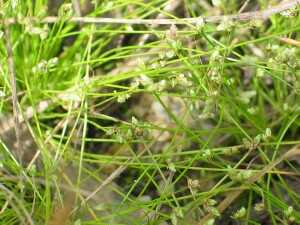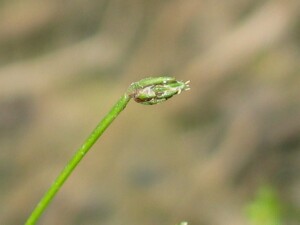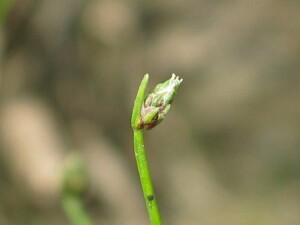Nodding Club-rush
Back | Salinity Indicator Plants Home | Common name home | Scientific name home | Photo Gallery | Glossary
| Nodding Club-rush photos | Family: Sedge (Cyperaceae) |
| Scientific Name: | Isolepis cernua (syn. Scirpus cernuus, incl. Isolepis platycarpasyn. Scirpus platycarpus) |  Nodding Club-rush plant Photo: A J Brown | ||||||
Other Common Name: | Nodding Club-sedge | |||||||
Status: | Native to all of Australia except the Northern Territory with related forms across the world. | |||||||
Plant Description: | Small, tufted or clump-forming perennial with a rhizomatous root system. Stems are very fine and 2-20 cm high with leaves greatly reduced or occasionally to 4 cm long. Spikelets 1-2, 2-6 mm long with a leafy bract below extending past the straw-coloured to orange-brown or dark-brown, spikelets. Fruit is a yellow-brown to black, triangular nut with rounded to angular edges, 0.5-1 mm long and 0.5-0.8 mm diameter. | |||||||
Habitat: | Common across lowland Victoria except for the Mallee. Occasional in the alps. Grows in permanently wet sites, including brackish and sub-saline environments.
| |||||||
Comments: | There are two varieties of Nodding Club-rush; var. cernua and var. platycarpa (syn. Isolepis platycarpa, Scirpus platycarpus). Hybrids and intergrades probably occur between them. The nuts of var. cernua are generally larger than in var. platycarpa. Both varieties are commonly found growing with other small sedges, such as Hooker’s Club-rush (Isolepis hookeriana) and Common Bog-rush (Schoenus apogon). | |||||||
Nodding Club-rush photos
 Stems and spikelets of Nodding Club-rush Photo: A J Brown |  Nodding Club-rush spikelet Photo: A J Brown |
 Nodding Club-rush spikelet Photo: A J Brown |


